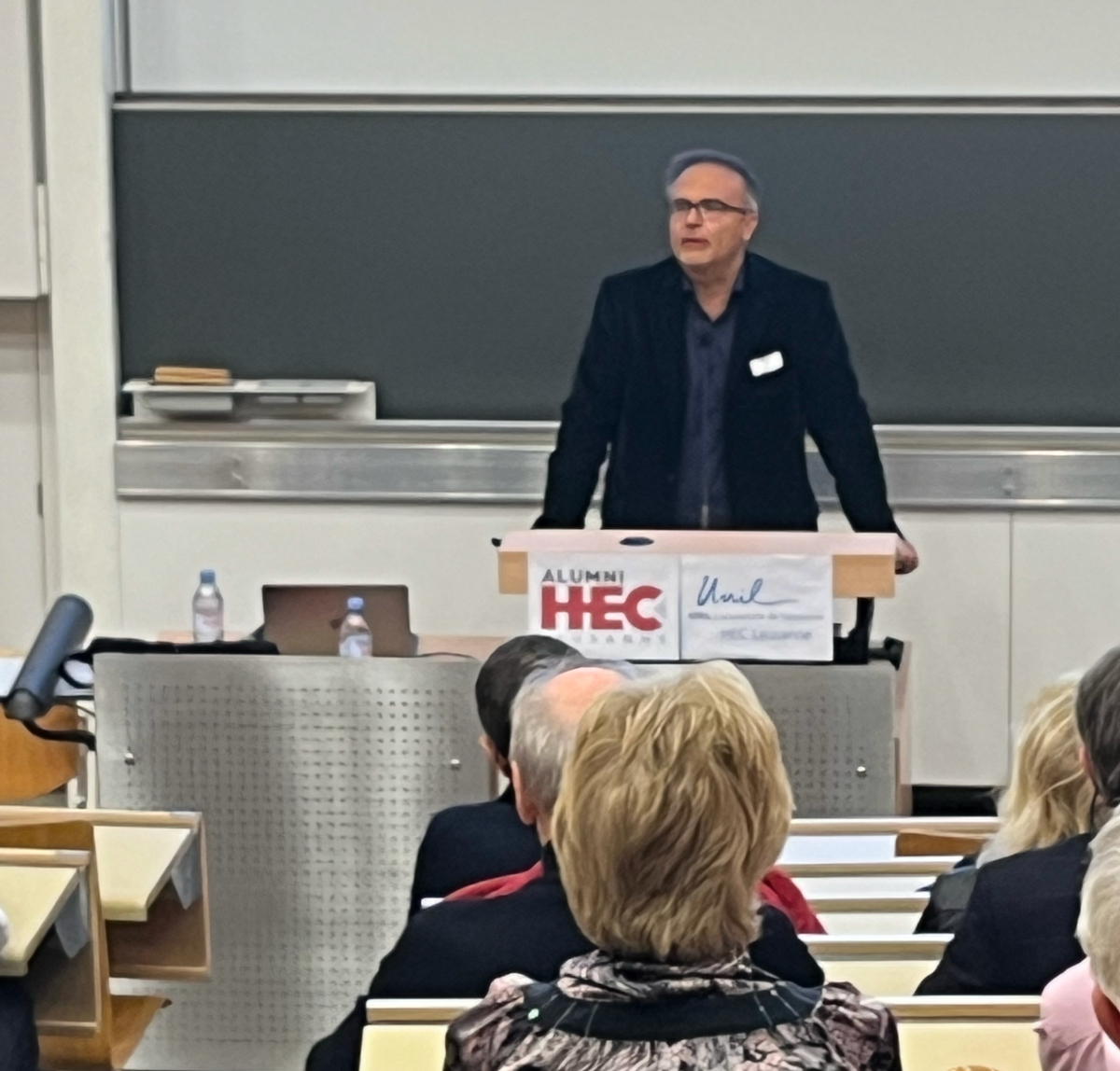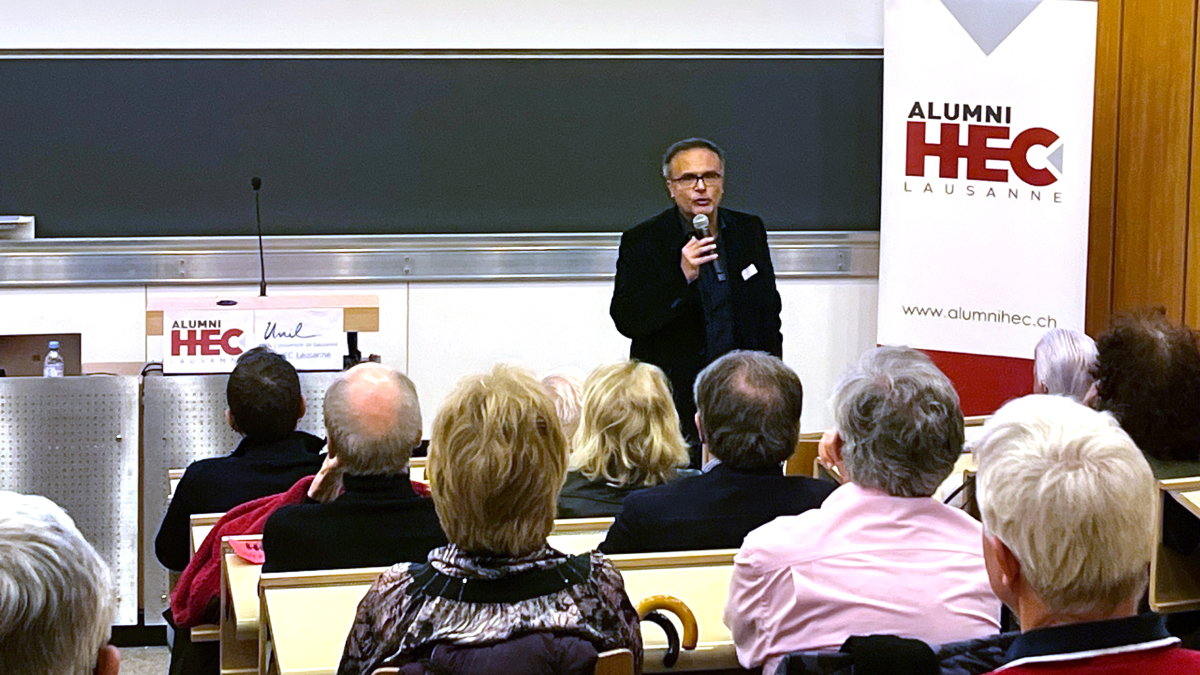05.06.2023
Life of the Association
Conference by Dan Staner - Messenger RNA, the next revolution in the world of health
Moderna's recent implementation in Europe. We started hearing about this company not long ago, as the race to a COVID 19 vaccine was in full swing, but few people know that when the name was first heard in 2020, Dan Staner (Swiss director of Moderna) had just been hired and was Moderna's first employee in Europe. The company, which was founded in 2010, has expanded dramatically in the last few years thanks to the pandemic. Its Swiss director compares this event to the iPhone for Apple, which also brought the fruit-logoed giant into the big league. From one employee in 2020, there are now more than 200 in Switzerland.
Moderna, more than just a pharmaceutical company
Dan Staner (HEC'93) emphasizes that Moderna is, more than its competitors, a technology platform that aims to improve production techniques in the pharmaceutical industry. In the collective imagination, Moderna is only known for COVID, but the company has many other activities, and currently has 48 drug development programs thanks to the 18 billion dollars generated (5 to 6 of which have been reinvested in research). For example, they are currently developing personalized vaccines to fight certain types of cancer. The purpose of messenger RNA is to use one's own body by giving it instructions to fight disease.
The technology of messenger RNA
He compares RNA to the software that gives the body the instructions to produce the right reaction against the disease. Many people did not believe in this technology a decade ago because the immune system would destroy the RNA sequence before it could give instructions. Therefore, it was necessary to create some form of protection to ensure the delivery of the RNA into the body. This protection was created after 7 to 8 years of research in the form of lipid nanoparticles that act as a barrier around the RNA sequence until it is assimilated by the organism. The third challenge was to find the balance between these two substances so that the vaccines are stable and can be stored and transported. The logistical advantage of this technology is that this principle is used for all their vaccines. Moderna can therefore centralize its production in a single plant, saving huge installation costs. Research and development times are also accelerated because understanding the disease is enough to adapt the RNA formula to it. It is thanks to this technology that the COVID vaccine was created in just 11 months and the vaccine for the Omicron variant, after the strain was defined in June 2022, has already been delivered in September of that year in the United States.
The commercial future of Moderna
There are now 500 to 600 employees in Europe in just 3 years, so Moderna's evolution is exponential. This growth also brings with it new challenges. First of all, we have to manage the extremely rapid growth in the number of employees and the number of programs in development. Each step in the creation of the vaccine is assigned to a partner company in Europe, from the creation of the substance to the syringe, which also increases the number of people to collaborate with. In the next 2 years, the company plans to launch research on the 15 most dangerous pathogens according to the WHO in order to anticipate their potential spread (e.g., if Zika were to be transmitted to humans) and thus be able to address the problem as quickly as possible. Dan Staner explains that another goal is to make this technology available to everyone, the only problem being the technical difficulties associated with RNA, which therefore prevent other labs or researchers from replicating the RNA formula. Moderna does, however, offer to help by providing the drugs if laboratories ask for them a spart of a specific problem, with the unwavering aim of protecting global health. Finally, Moderna also wants to develop partnerships with countries that could potentially be isolated during future pandemics. The company wants to build factories in these countries so that they can produce their own vaccines and are not limited by import restrictions (like Australia, England or Kenya for the African continent).

How to manage the company's hyper-growth
After shaking up the healthcare world in recent years, Moderna must remain focused on the future with the will to continue innovating. Recruiting staff is therefore very peculiar because people joining the company must be aware that all their work may become completely obsolete in 2 or 3 years. The Swiss director of Moderna explains that the main qualities he is looking for are an innovative spirit and the ability to constantly question oneself. To ensure permanent training of its employees, Moderna has created its own university and teaches artificial intelligence to all its employees, whatever their role in the company. One objective is to rely on the digitalization of processes in order to gain in efficiency and thus limit itself to a workforce of 8000 to 9000 employees. He then explains that Moderna's core values are adaptability, the ability to work under pressure and risk management. The firm is able to make 90-degree turns in its research when faced with an impasse, so the work of many employees can change completely overnight and a precise career plan is not possible. The company wants to avoid viscosity, which means that as soon as a person is no longer the most qualified for his or her position, he or she will have to leave in order to allow the company to develop in the most efficient way possible. The good of the company must therefore come before that of the individual. Building a company that is evolving so quickly is a challenge that Moderna faces every day, and investing in each individual by training them allows employees to keep up with the company's evolution and new needs. To work at Moderna, you have to be able to reinvent yourself every day to satisfy the common good, the good of the company.
Valentin Mermoud, HEConomist




